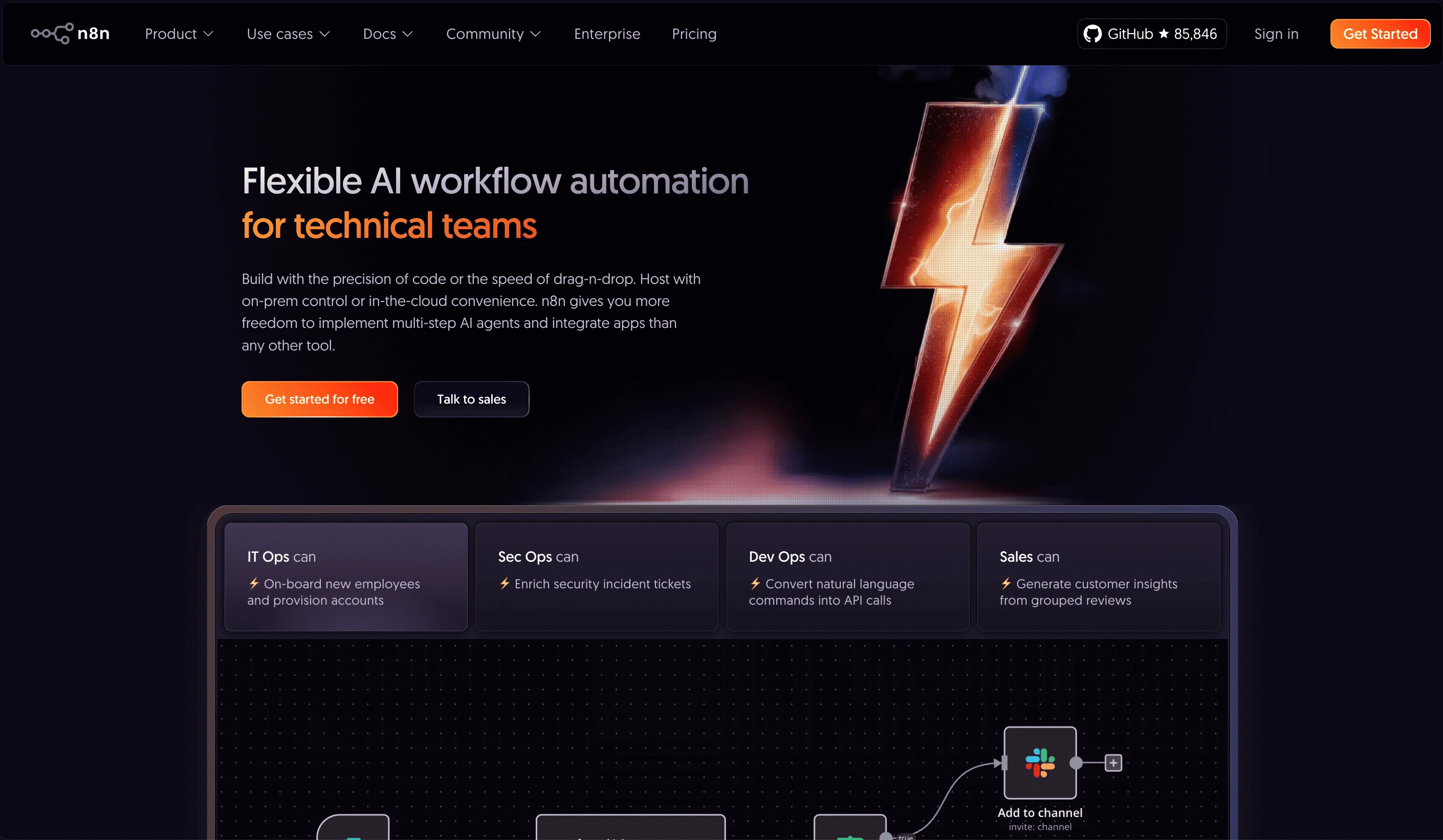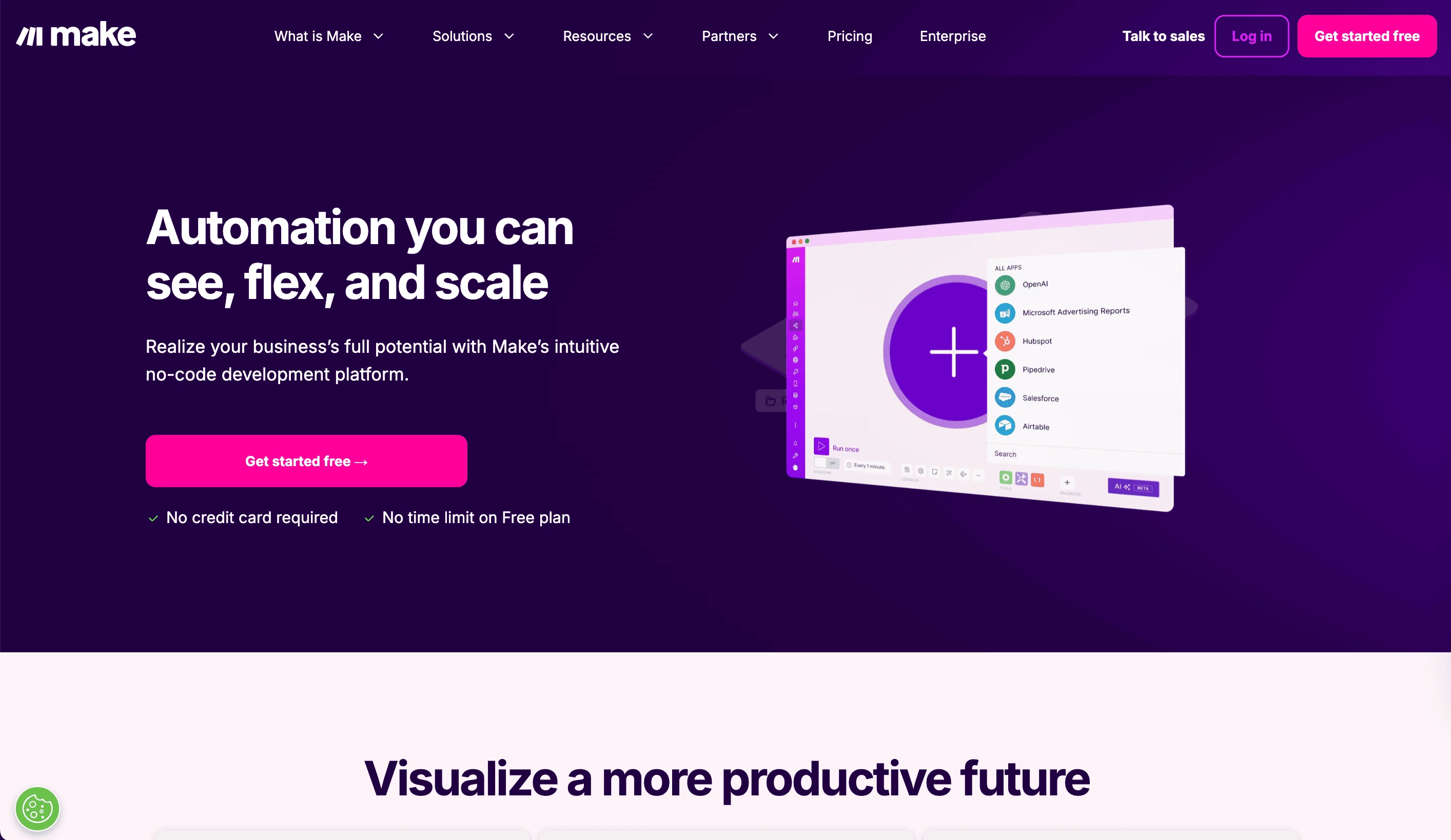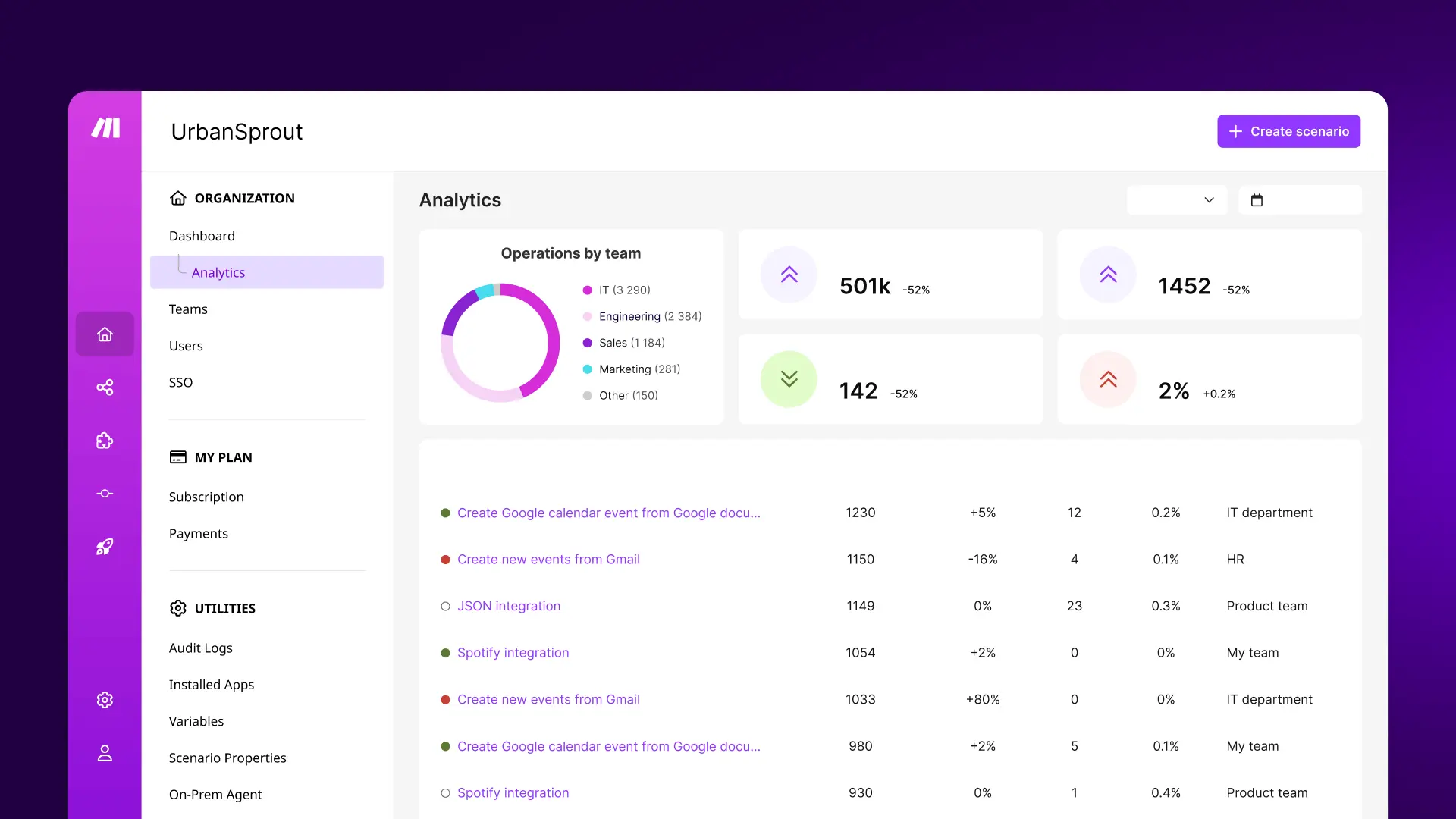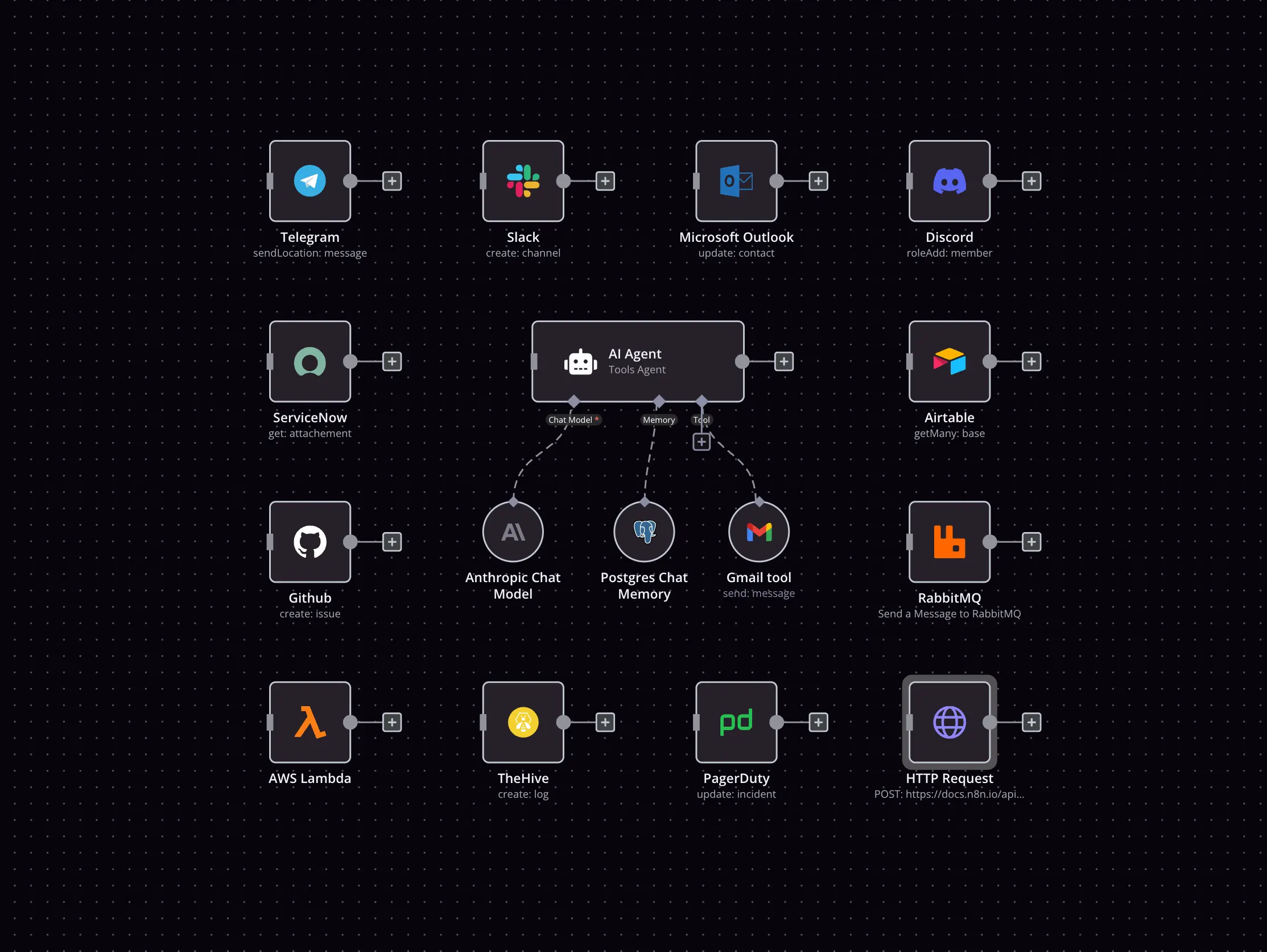our to-do list is a monster. Emails to sync, CRMs to update, social posts to schedule - and you're doing it all by hand.
Automation tools like N8N and Make promise to tame that beast, but picking one when you're new to the game feels like choosing a doctor without reading reviews. I've been there. My first automation attempt - linking my blog's sign-up form to a spreadsheet - ended in a mess of duplicate entries and one very cranky subscriber.
After testing N8N and Make, breaking a few workflows and digging through X posts, Reddit and sites like Cybernews, I'm here to help you choose without the trial-and-error pain. This is N8N vs Make for 2026: who they're for, what they do and why one might be your workflow's savior - or its downfall.
Why Automation Matters (and Why N8N and Make Stand Out)

Automation isn't just a buzzword; it's a lifeline. It takes repetitive tasks - syncing data, sending alerts, updating records - and hands them to software so you can focus on what matters, like growing your business or binge-watching without guilt.
N8N and Make are two of 2026's top automation tools, each with a knack for connecting apps and streamlining processes. They're popular because they're powerful yet accessible, whether you're a coder or a complete newbie seeking a way to automate their job. Combine these automation platforms with other no-code marketing tools for comprehensive workflows.
Why am I writing this? Because I've wasted hours on bad tools. My blog's email fiasco taught me that the wrong platform can cost you time, money and sanity. N8N and Make caught my eye after I saw X users raving about Make's ease and N8N's free self-hosting. I tested both, built workflows and learned their quirks. Now, I want to save you from my mistakes and help you pick the tool that fits your life - whether you're a marketer, entrepreneur or freelancer.
N8N and Make are leading workflow automation tools in 2026. N8N's open-source, self-hostable platform (free or $24/month cloud) suits coders needing flexibility. Make's no-code interface (from $9/month) offers 2,400+ integrations for beginners. Choose N8N for custom, budget-friendly flows; pick Make for quick, intuitive setups.
What Are N8N and Make?
N8N: The Coder's Flexible Friend

Launched in 2019, N8N (pronounced “n-eight-n”) is an open-source automation platform built for control. You can self-host it for free on your server or use N8N Cloud (from $24/month). Its node-based canvas connects 1,000+ apps, APIs or databases, with JavaScript or Python code nodes for custom logic. It's a hit with developers and AI enthusiasts for its LangChain integration and data privacy options, boasting 41k+ GitHub stars.
- Why It's Good: Free self-hosting, AI agent support, open-source community.
- Why It's Tough: Steep learning curve, fewer integrations, server setup requires tech chops.
Make: The No-Code Newbie's Dream

Make, rebranded from Integromat in 2022, is a cloud-based no-code platform born in 2016. Its drag-and-drop “scenarios” make automation feel like a game, with 2,400+ integrations for apps like Slack or Shopify. Plans start at $9/month, but costs scale with “operations” (each action counts). Businesses and beginners love its polish and enterprise-grade compliance, like GDPR and SOC2.
- Why It's Good: Super intuitive, vast app library, beginner-friendly tutorials.
- Why It's Tough: Operation-based pricing adds up, limited customization, no self-hosting.
What is the difference between N8N and Make?
Let's break down how N8N and Make compare on ease, cost, integrations and more. I've built workflows on both, crashed a few and cross-checked insights from other sources like user reviews to give you the real picture.
Ease of Use: Can You Actually Use It?
Make: It's like sketching a flowchart. The drag-and-drop editor connects “modules” (e.g., “Post to X”) into scenarios. I linked my Trello board to Gmail for task alerts in 10 minutes - no coding needed. Tutorials and error alerts make it forgiving. X users call it “dummy-proof”, but coders might feel boxed in.

N8N: It's a tech puzzle. The node-based canvas links triggers (e.g., “New form submission”) to actions, but nodes take time to master. My first webhook setup failed hard, but a Reddit thread helped me build a 20-node flow for podcast uploads. It's not beginner-friendly but thrills techies.

Verdict: Make wins for instant usability. N8N's for those who don't mind a learning curve.
Pricing: Will It Break Your Budget?
Pricing can sink you if you're not careful. Here's the breakdown:
N8N: Self-hosting is a budget dream - I ran N8N on a $5/month Hetzner server for free workflows. Cloud plans charge per execution, so a 50-step flow costs the same as a 5-step one. It's ideal for heavy, complex workflows but needs server skills.
Make: The free tier's solid for light use, but operations add up. My Shopify-to-Slack stock alert hit 2,000 operations in a week, nudging me toward the $29/month plan. It's affordable for simple flows; businesses love the compliance perks.
Verdict: N8N's free self-hosting wins for budget or complex flows. Make's pricing suits quick, light automations.
Integrations: Do They Connect Your Apps?
Make: With 2,400+ integrations, it's plug-and-play heaven. I synced my Etsy shop to Google Sheets in minutes. HTTP modules handle custom APIs, but they're less intuitive than N8N's options.
N8N: Offers 1,000+ integrations - fewer but versatile. Its HTTP node and code options let you connect niche APIs. I built a flow for a CRM systems Make didn't support, though it took an hour of JavaScript. X users praise N8N's API flexibility but crave more native apps.
Verdict: Make's library is unmatched for popular apps. N8N excels for custom or obscure integrations.
Customization: Can You Tweak It?
N8N: A coder's playground. Code nodes support JavaScript or Python and you can build custom nodes or modify the open-source core. I used N8N's LangChain node to create an AI chatbot for customer queries - Make couldn't match that. It's overkill for basic tasks, though.
Make: No-code through and through, with pre-built logic for filters and loops. I hit a wall trying to transform complex JSON without an Enterprise plan. It's slick for standard flows but limits tinkerers.
Verdict: N8N's customization is king for coders. Make's no-code setup is perfect for newbies.
AI Features: Are They 2026-Ready?
N8N: A standout for AI. LangChain nodes let you build AI agents for tasks like data summarization. I automated blog comment analysis with GPT-4, saving hours. It's not a full AI platform like SmythOS, but it's cutting-edge for automation.
Make: Supports AI integrations (e.g., OpenAI), but it's basic - think sending prompts, not building agents. Reddit users note Make's AI is “functional but shallow” compared to N8N.
Verdict: N8N leads for AI-driven workflows. Make's AI is fine for simple tasks.
Support: Who's Got Your Back?
N8N: Leans on its open-source community (Discord, Reddit). I got a node fix from their forum in hours, but cloud support is ticket-only. Self-hosters need to troubleshoot solo sometimes.
Make: Offers premium ticket support and a wealth of tutorials. I found a YouTube guide for every Make scenario, making setup a breeze. Enterprise users get 24/7 help.
Verdict: Make's tutorials win for newbies. N8N's community is solid for techies.
How They Stack Up Against Competitors
N8N and Make aren't alone - Zapier, SmythOS and others are in the ring. Here's a quick comparison:
Zapier: Easiest for quick tasks but costs more and lacks N8N's flexibility or Make's pricing edge.SmythOS: Great for AI but pricier and less beginner-friendly than Make or N8N.
Why They're Popular: N8N's open-source model and AI prowess draw developers and startups, with X users praising its cost savings. Make's no-code simplicity and vast integrations make it a go-to for businesses and newbies, per Make's own analysis.
Who's N8N For?
N8N's your pick if:
- You're tech-savvy or eager to learn, comfortable with APIs or code.
- You want free self-hosting for cost or data control.
- You're building complex or AI-driven workflows.
Example: I helped a friend's startup use N8N to sync 100+ data sources for analytics, saving $400/month vs Zapier.
Downsides: Not newbie-friendly, fewer native apps, server setup can be a hassle.
Who's Make For?
Make's your choice if:
- You're a beginner wanting fast, no-code setups.
- You use popular apps like Shopify or Gmail.
- You need enterprise features like GDPR compliance.
Example: My cousin's bakery automated order updates from WooCommerce to Slack with Make in an hour.
Downsides: Costs rise with operations, less flexible for custom needs.
My Experience: Why I Lean Toward N8N (But Make is Still Great)
My automation journey started with Make's no-code magic. I set up a flow to ping my Slack when new subscribers joined my blog - done in 20 minutes. It was so easy I felt like a pro. But when I tried to build an AI agent to summarize feedback, Make hit a wall. Enter N8N. It was tough - my first node setup crashed spectacularly - but once I got the hang of it, I built a free, 40-node flow on my server that synced APIs and ran AI tasks. It saved me $60/month compared to Make's paid plan.
Still, Make's tutorials are a godsend for non-techies. If I were guiding my non-tech mom, I'd pick Make. For my coder side, N8N's my tool. Your call depends on whether you want quick wins or deep control.
Why I Think They're Good (and Sometimes Bad)
N8N:
- Strengths: Its free self-hosting and customization make it a budget-friendly powerhouse. The AI nodes are a game-changer for 2026's AI-driven world.
- Weaknesses: The learning curve is brutal and self-hosting isn't for everyone.
Make:
- Strengths: Its ease and integration library make it a no-brainer for beginners. Enterprise features like SOC2 compliance are a big draw.
- Weaknesses: Operation-based pricing can sneak up on you and customization is limited.
I think N8N's better for long-term flexibility, especially if you're budget-conscious or tech-savvy. Make's better for speed and simplicity, but its costs can sting if your workflows grow.
FAQs About N8N vs Make
1. Which is better for beginners, N8N or Make?
Make's drag-and-drop interface and tutorials are easier for newbies. N8N's node system suits those ready to tackle tech.
2. Can I use N8N without paying?
Yes, N8N's self-hosted version is free with your server. Cloud plans start at $24/month. Make's free tier gives 1,000 operations/month.
3. Why are N8N and Make popular in 2026?
N8N's open-source flexibility and AI nodes draw coders. Make's no-code ease and 2,400+ integrations appeal to beginners and businesses.
4. Which has more integrations, N8N or Make?
Make leads with 2,400+ native integrations. N8N's 1,000+ integrations shine with custom API options for niche needs.
5. Can N8N or Make handle AI automation?
N8N's LangChain nodes excel for AI agents, like chatbots. Make supports basic AI integrations but lacks agent-building depth.
.svg)










